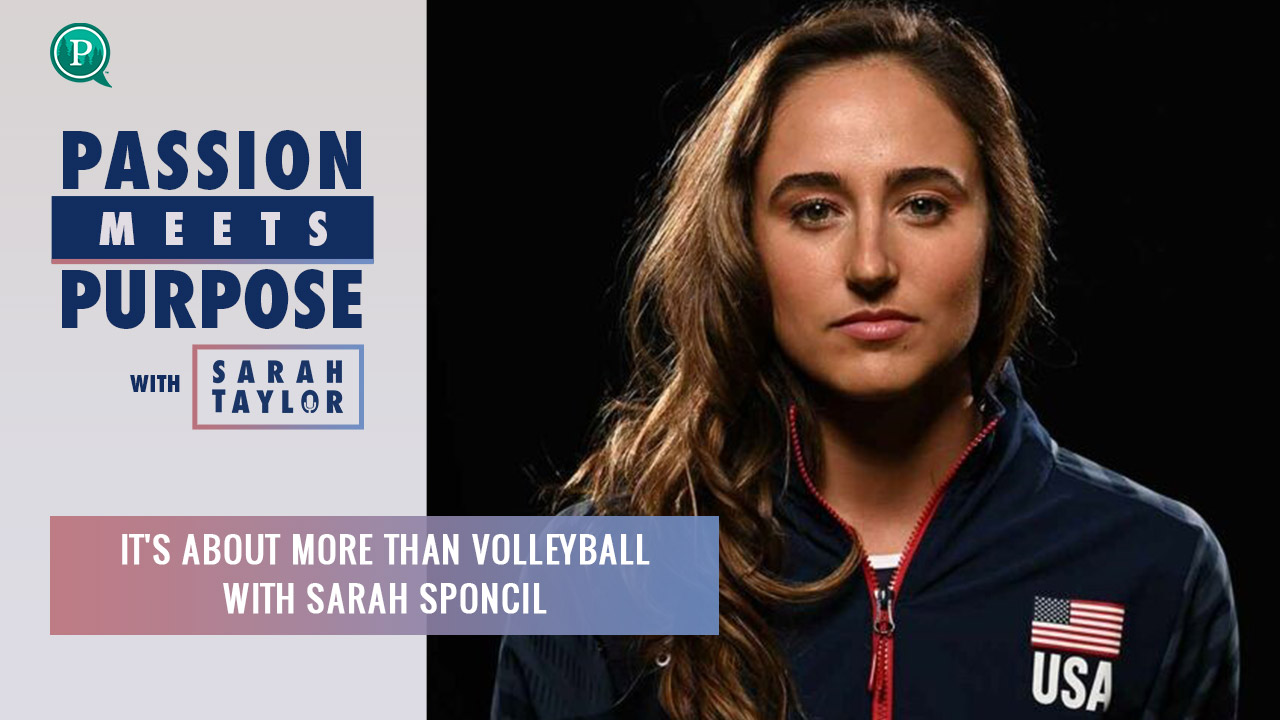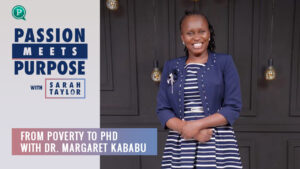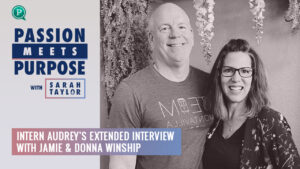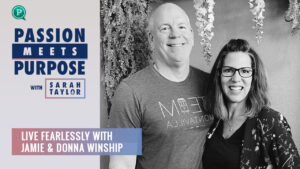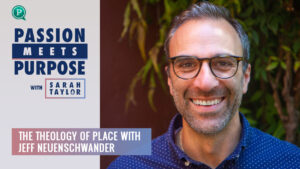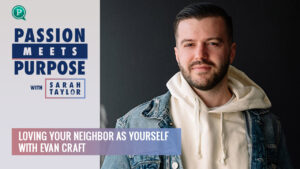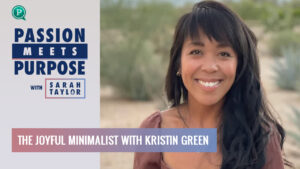All Sarah’s dreams were coming true but she still felt lonely. It simply wasn’t enough. Sarah Taylor talks with USA Volleyball player Sarah Sponcil about where her identity comes from and why she is so passionate about her faith.
Interview Links:
Find Sarah Sponcil: Online | Instagram | Facebook
Transcription:
Purposely. Your life, God’s purpose. Listen at onpurposely.com
Sarah Sponcil:
God was saying, “I’ll give you everything in your life.” I won three state titles, national championships, an Olympic …. I was the youngest, almost the youngest, Olympian for the US for beach volleyball, but it’s never going to satisfy you. And I really came to know that. And it was so freeing. I’m like, “Well, it’s not about me anymore. I am never going to be satisfied with what I do, so let’s make it all about Him and let’s serve Him, because, I mean, at the end of the day, He’s created us so that’s pretty amazing.”
Sarah Taylor:
So excited to welcome Sarah Sponcil to the Passion Meets Purpose podcast. Sarah, you exemplify this so well. There are several things you’re passionate about. One of them is obviously being in the Olympics as a volleyball player, and we’re going to talk about that, but your passion goes much deeper when it comes to your faith and the way that you give back to those around you and serve in some of the most remote parts of the world. Let’s start, before we get that, with my favorite question to ask, which is, Who you are now, what hints of all the gifts and talents that God gave you were there, like toddler Sarah, like early elementary Sarah? What would your parents say? Like, oh, I saw this in you back then.
Sarah Sponcil:
Oh, I mean, volleyball comes to the forefront of my mind right away. My parents, they were in church leagues and they would play volleyball, and so we got into volleyball around the age of 3, and my sister was three years older, so around the age of 6. So I think right away we were put in that sport. And my dad was my coach all the way through high school. So I think at an early age, they knew that I was pretty athletic. And so I think, yeah, that’s pretty much, I would say volleyball. That was what I breathed since I was about 3 years old.
Sarah Taylor:
I like the way that you describe it on your bio. I want to get the quote. You say, “Mostly, I’m just a big kid who’s thrilled that my job is playing a sandy version of keep the balloon off the ground.”
Sarah Sponcil:
Exactly, exactly. I know it’s crazy because we’re playing against the best teams in the world, but when you just put it back to you’re 6 years old, playing on your indoor team type thing, it’s like you’re literally just a kid just trying to keep the ball off the ground. So as intense things get, you can always kind of revert back to that.
Sarah Taylor:
Most parents look at their 3-year-old playing volleyball or something, and everyone thinks their kid has talent. Everyone’s like, oh, man, my kid is the best. When was the moment your parents were like, oh, my word, my kid really is the best?
Sarah Sponcil:
Oh, my gosh. Well, I started on my first club team when I was 6 years old, so my spandex didn’t fit my knee pads. I don’t know how they stayed on my knees, but I think I was always playing up. And I mean, 12s is where you really start being on a team. And I was 6 at that time, so I had lots of years at the 12s Division, but my sister was three years older so I think just being around her, and she was in the sport as well, it just gave me something to strive for. And I think you look at all the really good athletes, and I think a lot of them are the younger sibling because the older ones are a little bit stronger, a little bit faster, and it’s like the little one’s are like, I can do that too, and they push you.
Sarah Taylor:
That’s so true. And then you mentioned how your dad was your coach. Now, I think I heard you say previously, was he a stay-at-home dad?
Sarah Sponcil:
Yes, he was. Yeah, so basically, since I was a baby, he had a job, and then it was me and my sister, and it just kind of worked out that way. Yeah, he just drove us to school, drove us to all of our practices, and then Mom was the cheerleader, so it all worked out.
Sarah Taylor:
I remember you saying that he was just sort of up for anything. You’d be like, let’s go to the gym. It’d be early in the morning. It’s like, well, okay.
Sarah Sponcil:
Yeah, no, yeah. I think the best memories are pretty much from, I would say, second grade to fifth or sixth grade. We’d go out in the back basketball courts at St. Thomas the Apostle, my school at the time. And we would get there an hour, hour and a half early and before the bell rang, and we would work on setting and serving. And he was always pushing me and down balling it really hard on my platform. And I’d get mad at him. He is like, you know what? One day you will thank me for this. So yeah, he was always down for anything. He was a great dad.
Sarah Taylor:
Do you remember the moment where you would legit beat him and he would try as hard as he could?
Sarah Sponcil:
Oh, my gosh. I don’t know. I mean, I have so many memories, but there was this specific gymnasium that we would go to, and every day before practice, we would run down the hallway as fast as we could. And he’d always beat me, but then there became a day when I beat him. And I think there was just that competitiveness, but I don’t know, I think probably around 12, 13, 14, things were switching tides.
Sarah Taylor:
And so this took you through high school and then obviously played a big role in where you decided to go to college.
Sarah Sponcil:
Yeah, yeah. I committed to Loyola Marymount University at 14 years old, so I was about ending my freshman year. I honestly didn’t know what college was, so I mean, I just ended up getting yet some really good coaches. But one of my idols growing up, she went to the same club as me from Arizona and she went over to LMU. And so just my idol being there, I think at 14 years old, I’m like, oh, it’s a good school, great coaches, I’m going to go there. But like I said, it all worked out and ended up transferring to UCLA at the tail end of my career. And yeah, it was great.
Sarah Taylor:
And so what happened after you graduated?
Sarah Sponcil:
So pretty much right after I graduated, I was right on the world tour with my partner at the time, and I think we won the national championship May, I don’t know, 9th, and three days later, I was on a plane to Brazil for my first international stop of the season. And so we were on the road for, geez, five months on and off. And it was definitely a transition right after college, but we were, yeah, full force ahead for the Olympics at that point.
Sarah Taylor:
I’m reading now that you and Kelly, is it Claes?
Sarah Sponcil:
Yeah, her last name’s Chang now, but yes, it was Claes at the time.
Sarah Taylor:
You were both the youngest team in history to represent the USA in beach volleyball.
Sarah Sponcil:
Yeah.
Sarah Taylor:
What did that feel like?
Sarah Sponcil:
I mean, I get this question a lot, but I think after I graduated, up till the Olympics, it was just a whirlwind. I felt like I didn’t even plan to play professional beach volleyball until my senior year, when I started it. I did well in one professional event. And so yeah, it was just a whirlwind, going on the world tour. I mean, we were doing well. We started to see that we could compete with the best. But yeah, being that young, it’s like you don’t have as much experience as all these veterans. Kerri Walsh was who we were fighting against pretty much up till the last month of the Olympics. And she’s gone to five Olympics at that point and you’re like, oh, my gosh, she might have experience, but I mean, we’re young, we can travel 20 hours and be fine off a flight.
And so I think we had fun with it, but it was, yeah …. The word that comes to mind was whirlwind. There’re lots of emotions and you’re excited because your dream’s within reach at that point and you hope you get it. But yeah, lots of traveling, lots of new things. I’m trying to become an adult, so yeah, lots going on.
Sarah Taylor:
Tell me more about that transition, trying to become an adult.
Sarah Sponcil:
Yeah, I mean, going from high school to college, you’re like, oh, you’re in college. You’re like, yeah, I’m doing school and I’m waking up early and I have time management. I think that’s the biggest thing I learned was time management. But beach volleyball is so different because you do everything yourself. You’re buying your own flights, you’re buying your hotels and food, and nothing is done for you. It’s like you and your teammate and you’re kind of yourselves against the world. And so that was just new. I mean, we never booked any of that stuff. And I mean, it’s expensive to travel around the world. It’s not like you get a salary. It’s like you do well and you make money.
And so there’s that in the back of your head. And you’ve got sponsors, and then that pressure kind of builds to where you’re like, well, I’ve got to perform for my sponsors. And I think a different type of pressure was forming for me that I had never experienced from college. I mean, life, money, things that you don’t have to think about, but then your dream is right there. And so there’s so much that goes into just stepping on the court is how I like to put it. Sometimes you just want a crane to just pick you up and set you on the court, but there’s so much that leads up to it.
Sarah Taylor:
Take us into some of the mental preparation, because even if someone’s not a beach volleyball player, everyone understands all of those different emotions of needing to perform at a certain level and the pressure that comes with it, or being in a culture that you don’t know or understand or know how to navigate, all of that. What are some of your insider secrets on how to manage all that going on in your head?
Sarah Sponcil:
Yeah, I mean, I think the biggest thing that I had to learn is just deal with the adversity. There’re so many times where you’re flying and your flight’s delayed or then you miss training or the food’s not great with your stomach and then you go on the court. It’s like, how can you learn to just brush all that off and not let it affect your play? It’s very hard, but I think the more that I’ve been on tour, the easier it’s become. But it’s never easy. You’re never comfortable. You might get wins, but you’re facing off against the best 16 teams in the world at this point, and they have every single stat on you. So I think the more that you can just be confident in the moment and kind of brush plays off, I think that’s the beauty of beach volleyball is you get tons of points.
So as long as you can take that point and whatever happens, just move on, the more you can be connected to your partner. I think beach volleyball is the most unique sport in the world because it’s just you and your partner. It’s basically a marriage. You’re traveling together. You win, you lose. So to me, I think you have to have that chemistry on and off, and you have to have a bigger life perspective. Yeah, you’re going for this goal, but there’s so much you need to support each other in, aside from that goal, to make things work.
Sarah Taylor:
Another part of that bigger perspective for you is your faith. Can you tell me a little bit about how your faith has grown through just the trajectory that you’re on in your life?
Sarah Sponcil:
Oh, my gosh. Yeah. I think growing up, my parents, we were at a Catholic school. My parents raised us Catholic, but I was that person, that athlete, that could care less. I was thinking about volleyball in church, and then our school would, on Fridays, all gather at church, and then my mom’s on Sunday, okay, we’ve got to go again. I’m like, why do we have to go again? And so yeah, God was not a thing in my life. And I talk about the pressures after college and about money and needing to perform and chasing your dreams and it’s within reach. And there’s a couple different moments that I can revert back to, leading up to the last year of the Olympics. And I just felt all alone. And there was a time where I’m like, God, I don’t know. I feel like I have everything that I want right now. I’m in such a good place volleyball wise, but I feel alone. I feel empty. And I just was like, help me. I don’t even know what’s going on.
But I think it really wasn’t until after the Olympics. There’s actually, really a come-to-Jesus moment, if you like to call it. But I was on the flight back from Tokyo to LA, and I went to the bathroom and yeah, there’s a lot of emotions running through my head. I felt very empty. I felt unfulfilled, but I had achieved my dream, basically, at that point minus a medal. And there became a realization that my identity was so encapsulated by volleyball. That was my number one priority. And I idoled it, for sure, since probably 3 years old. I think I never really said that and thought that out loud. And at that point, I honestly felt like people only liked me for volleyball. That’s honestly why I was only on this Earth. Not that I actually believed that, but that’s how I felt. I’m like, am I only on this earth to play volleyball and win matches and then go to bed and do it all over again?
And it was just, yeah, it felt very, yeah, I felt chained. While I was in the bathroom, I had that identity crisis, and I was like, I knew deep down with the different conversations that I had with God, but I put him in a box and I was like, the only person that’s really going to tell me who I am besides a volleyball player is Him. And from that moment on, I was like, I don’t care if I become the worst volleyball player of all time. There’s an identity crisis going on. But I was like, I don’t care if I lose every single match, but I need to know and I need to dedicate my life to Him and serve Him and get to know Him.
And after that, the season ended. I had a couple more tournaments, but I opened the book. I opened the Bible for the first time in my life, and I started reading it. I had no idea what I was doing, but I was just praying. I was like, I want to get to know You, but I also want …. People talk about this fellowship thing. I’m like, I don’t know, but I want it. And I ended up finding a church about a couple months into the 2022 season. My priorities have really changed, and I think it’s something that I have to work on every day. It’s something that you’ve ingrained in your head for 20 years, but whenever I’m close to Him, whenever I’m in my words, it’s really hard to explain just the peace that I have, and I just found so much more joy.
The chains, I feel like, have broken. And yeah, it’s not the end of the world if I lose. And I’ve just met so many amazing people, and I think just me as a person has changed. I’ve met and talked to people and become friends with people I would never have talked to or even thought to look at. It’s really changed my whole outlook on life. And so yeah, that’s my story, but I could go on and on, but I think it’s volleyball. There became a point, and I think it’s just crazy how I think God was saying, I’ll give you everything in your life. I won three state titles, national championships, an Olympics. I was the youngest, almost the youngest, Olympian for the US for beach volleyball. But it’s never going to satisfy you. And I really came to know that. And it was so freeing. I’m like, well, it’s not about me anymore. I am never going to be satisfied with what I do, so let’s make it all about Him and let’s serve Him, because I mean, at the end of the day, He has created us. So that’s pretty amazing.
Sarah Taylor:
You mentioned that you needed an identity beyond Sarah, the volleyball champion. What is the identity that you found when you saw Him and said, who am I to you?
Sarah Sponcil:
I mean, the phrase that comes to mind is, I am a child of God. And I am his ambassador, and I want to represent that everywhere I go. And of course, it’s a challenge. You’re constantly reminded. The more you’re near Him and his Word, you’re constantly reminded of just your sinful nature and what you think and what you say out loud. I used to be a horrible cusser. Everyone knew it, but I would like to say I’ve gotten better. But yeah, I think that that phrase, I’m a child of God, really just grounds me and humbles me down to the ground. And it is just freeing to know that everything’s been paid for just what he did, coming to the Earth and saving us from our sins and dying on the cross.
And there’s really nothing we can do but love Him and look to Him and honor Him and glorify Him. And that’s freeing. I felt like my whole life, I’m trying to achieve all this stuff, but at the end of the day, it really doesn’t matter. I mean, yeah, our earthly desires, that’s us being human, but that constant reminder that He loves us so much and He just wants us to glorify Him and just get to know Him.
Sarah Taylor:
Yeah, it’s a delicate balance, right?
Sarah Sponcil:
Yeah.
Sarah Taylor:
Because He also wants us to enjoy things. I think that when you play volleyball, it brings him glory because you have this platform. And one thing that you’ve recently done, and I want to hear all about it because you and I share this connection, that’s actually how we got connected, is World Concern, it’s a global relief organization that is a sister ministry of the radio station I work for. It’s all part of CRISTA Ministries. And so I’ve known about World Concern and these vision trips that they take. You just recently got back from one in Kenya.
Sarah Sponcil:
Yeah.
Sarah Taylor:
Why don’t you tell me …. First, how did you find out about World Concern and what tugged on your heart to want to get into partnership? And then let’s talk about the actual trip you took.
Sarah Sponcil:
Yeah, so yeah, I partnered with World Concern at the very end of this past year. And so I brought my agent on about a year ago right after the Olympics. And I just kept with my faith journey and just how much I realized that yes, volleyball is such a gift from God, and it brings me joy. Also, being in church and being around people that serve and that give themselves to other people, it made me do the same, just around my community. And it just brought me so much joy. And it’s such a different joy that I’ve ever really experienced. I think a win is great, but it’s not lasting. But when you get to really serve someone else, you never know how it’s going to impact them and for how long. And so I told my agent, I was like, yeah, sponsors are great, but I want to get into philanthropy.
And I think being a professional athlete, it’s very hard because you don’t really want to ever stop your season. As a professional athlete, it’s all about yourself. But for me, I was finding joy serving other people. And so my agent had a connection with World Concern, and he was like, hey, take a look. And I was getting on all the podcasts, the End Of The Road podcast, highly recommend. And I just loved what World Concern was about. And I’ve traveled to, I don’t know, 20 plus countries since I’ve been a professional athlete, and I’ve been able to see bits and pieces of the poverty. And recently, I stayed overnight in Ethiopia. I was going to a tournament. And there was this one specific moment that really hit me. It must’ve been two sisters. It’s a town. It looks, sadly, like a bomb went off. It’s like rubble. And hundreds of people at night are sleeping on the sidewalk. And these two sisters, must’ve been sisters. It’s like one has the right shoe and the other has the left.
And in those moments, I’m like, I want to give myself. Yeah, it’s not about me at this point. I want to give myself to the world and help in a way that’s bigger than I really ever thought was possible. And so yeah, we partnered together and our values aligned. And they’re a faith-based organization. And so we partnered at the end of 2020, geez, 2022. And so this trip was very fast and unexpected. And so Kenya, there’s a specific moment in Kenya, right after the Olympics, that stuck with me, and we played them in pool play. And right before we were training against them. And in the Olympics you give out pins and all these different things, but I don’t know, there’s something about, Gaudencia was her name, and she came over to us right before training. We were about to play her the next day in the Olympics, and she gave me a bracelet and it said Kenya across it. And the way that she gave it to me, she gave me such a soft, warm smile.
I don’t know. It really just took me aback because I worked my whole life to get to the Olympics, and I am very competitive. I’m like, you’re not my friend. You’re my competitor. We’re out for blood. That was, at that time, my mindset. And then she gives me this nice bracelet right before we’re about to face off in one of the most intense tournaments of my life. And it stuck, that memory stuck with me. And I was like, there is so much joy in this girl. And it made me kind of think about sports in a different way. Yeah, it’s competitive, but this girl Gaudencia brought something to sports that I’ve never really thought about, I guess, before. And Kenya and Gaudencia and Brackcides, they stuck with me in my mind.
So when I was talking to World Concern, they had been partnering in six different countries in Africa, one being in Kenya. So when they said that, when I found out that they were partnering, and I think they’ve been there for over 40 years, I’m like, that would be so cool to really get to know the people of Kenya. Because what I experienced for that split second in the Olympics, it stuck with me. So yeah, I mean three months in or four months into being partners, we were taking a trip to Kenya. And I was able to meet Brackcides and get NC and a couple of other national team players, and we went around to a couple of different villages, some very far off, one of the worst slums in Nairobi. And we were able to play volleyball and bring sport to these villages that have never really seen volleyball.
And I think it really just showed me the power of sports beyond what I ever really thought. To me, it was a game that I played and it was fun, but it really just showed me how much joy and hope that we brought to these kids that in these circumstances, sometimes they’re waking up in survival mode. They’re helping to get food for their families. And it was so amazing to see the joy that we were able to bring over the week that we were there. So yeah, that’s kind of trying to encompass it all, but it was, honestly, one of the best trips I’ve ever had. And like I said, I’ve traveled lots of times for tournaments, but this joy that it brought me, I honestly didn’t want to come back. I was like, can I just stay here and just give myself to people forever because yeah, it’s a different joy that you can’t explain. No win on the court compares to that.
Sarah Taylor:
When you process that on the flight home and you’re talking to God about all that you saw, just what have you learned about His heart for, you said it earlier, the end of the road. That’s the podcast. And Sarah’s right. It’s a fantastic podcast, the End of the Road podcast with World Concern. The reason it’s called that is because World Concern goes to the nooks and the crannies. We’re talking, they find literally the most remote villages. Sometimes there’s not even a road to get there, so they make one.
Sarah Sponcil:
Oh, my gosh. Yeah.
Sarah Taylor:
And so how do you process? What does God speak to you about? I think He talks to you on airplanes certainly. So what have you learned about His heart for people?
Sarah Sponcil:
I think it just showed me just how similar everyone is. We’re all loved by Him. And when I went over to Kenya, I’ve never really been in an area that was so outward about their faith. I mean, even Brackcides and Gaudencia, they were outward and they were praying right before we would go into the villages and World Concern. And even the villages that we got to meet that World Concern has been with for the last 10 years, we got to do that on the last day. But just how much faith these people have and just how much love they show to people, I mean, outsiders like me, yeah, it just showed me that He loves everyone and that we’re all the same. It really doesn’t matter your status or your fame or anything. We’re all here, and He has all created us. That was the biggest thing that I learned is that He has really reached every nation, every country, and there’s a lot that I’ve processed, but that’s one of the biggest things.
Sarah Taylor:
Does it make you excited to go on your next trip with them? Have you already thought about where that would be?
Sarah Sponcil:
Oh, my gosh. Oh, my gosh. I mean, honestly, when we were at one of the villages and these kids are begging for a high five or just a handshake and a smile. And honestly, we all say encouraging words after we did our exhibition matches and got to play with the kids. I don’t like to make promises, but I promised. I was like, I want to come back. And I just felt so loved by all these people in Kenya. And these villages, they don’t have much to give, but they do. Every village I went to, they’re showering me with gifts. And I’m like, oh, my gosh, I don’t have nearly as much as I want to give you guys in return.
Yeah, they showed me that really all you need to really find joy in this life is God and your family, and that’s what they had. And that’s all that we really need. So yeah, just to go back to that, I do want to go back to Kenya because I made a promise and I like to keep promises. But I mean, I think it’s something that you pray for. I think it’s just what we were able to do and the joy that I got to see. And the hope that we were able to bring these kids was something that I didn’t really know what this trip was going to bring me. I knew it was going to be a trip of a lifetime because it’s just so different than I’ve ever experienced. You go to a tournament, it’s all about yourself. But I was so excited because this wasn’t about me. It was about giving back to so many other people, and that’s what I’ve learned is that the more you give, the more joyful you are.
So like I said, it’s something I want to pray for, but it also, kind of going back to your question about what I realized. Coming back on the plane and the week I got back, I was honestly in a culture shock. I wanted to go back to Kenya because, yeah, it was simple, but it just showed me how noisy our lives are every single day and how we have to make it a priority to wake up and really know what our priorities are. God is just providing for our family. That’s all that really matters at the end of the day. But we have social media and horrible news and just things that are just right when you wake up, your phone’s off and you’re on your phone. And there’s just so much noise. But the more that you’re able to cancel it and get back to the root of why we’re here on this Earth, the more I think people will actually find that peace that we’re all looking for that’s going to satisfy us deep down.
Sarah Taylor:
Thanks so much for being here today on the Passion Meets Purpose podcast. We’re going to talk again in two weeks, but in the meantime, if you want to do us a huge favor, obviously, you know this by now. If you leave a review, it really helps others to find this podcast. It also helps us to make it better, and then you can contact us anytime at Purposely Podcasts. Until next time, thank you.
Follow this podcast:

